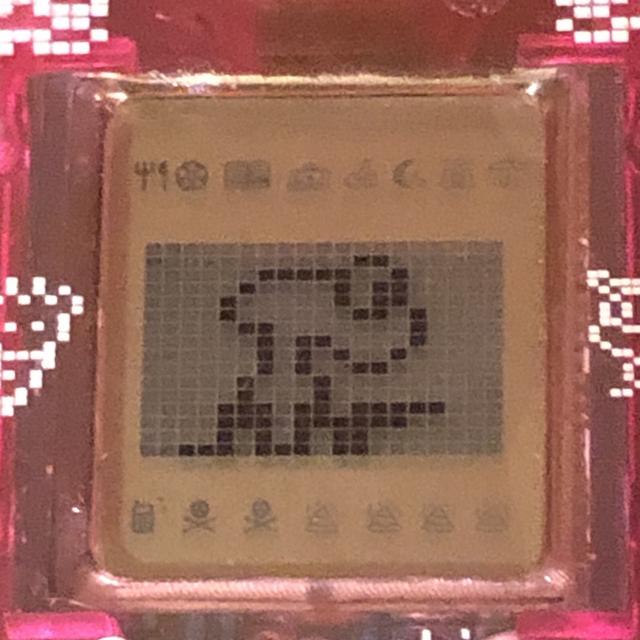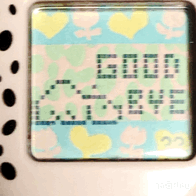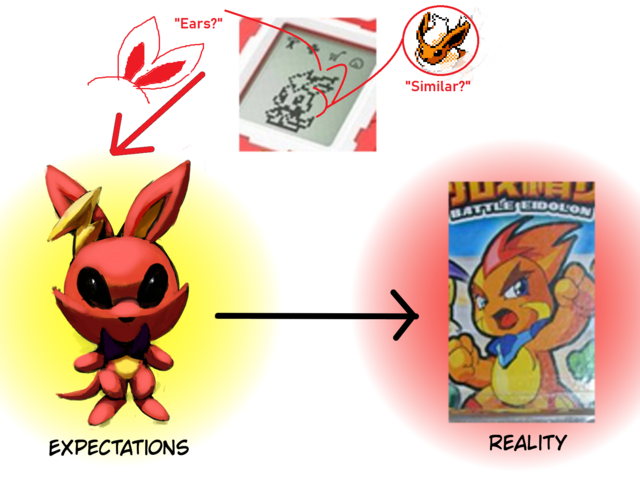This has nothing to do with OneSummerDream's log anymore, maybe the thread should be split...
There's not a lot of point, here - there's not a lot else left to be said, really.

A bootleg is only a classroom distraction for a brief time before it disappears into the junk drawer forever because it isn't fun. Individual copies don't sell anywhere near as much as a real thing, but all copies combined probably sold more in many countries.
The death screen comment was just a joke about the quality of bootlegs. Nothing happens on the death screen, so at least you can't mess that up.
That doesn't matter - it's still a distraction, and that is literally the only issue for teachers. It begins and ends there - genuine or competitor or bootleg or just someone's beeping alarm on their watch or their phone*, it doesn't matter. And they have no reason to go beyond that - they just want to get on with doing their jobs, and attacking international business doesn't fall under their remit.
*Let's not even get started on how distracting those are.

Pokémon became the world's biggest media franchise because The Pokémon Company, Nintendo of America, and Nintendo of Europe are competent companies who kept working through the onslaught, unlike the morons at Bandai America and Bandai Europe who let themselves be bullied out.
Bandai didn't let themselves get bullied out, though - the business prospects for the virtual pet toy category became less rosy in the 1990s because of market oversaturation, so they put their products on hiatus for a few years, as did plenty of other companies who had been making competing products. That's really all that happened.
But even they took massive hits. When the Nintendo DS got bombarded by widely available flashcards and the DSi failed to combat them, Apple and Google took advantage of the decline in portable game development to allow In App Purchase-based games into their stores, which they previously forbade. Now many children are only allowed by their parents to play IAP-games, which are unfun on purpose (to goad you into the in app purchases).
The Pokemon franchise started on the original Game Boy, though, and there were several generations between that and the DS. And the Nintendo DS family was and remains the best-selling video game console of all-time at the time of writing, so it wasn't affected that badly. It was for this reason, and no other, that the 3DS did not catch up to it - it simply couldn't after that sort of performance, and that merely happened to coincide with the acceptance of a general-purpose technology that could also be used to run passable games. Video game piracy happens on all platforms, unfortunately, and it always has - no conspiracy against one particular media franchise there.
You're right that cheaply-made mobile games are just manipulative cash-extraction programs (though such schemes started on dedicated consoles, to the best of my knowledge), but many parents only allowing these is a simple side-effect of the cost of living - these things appear to be "free", and to non-enthusiasts one game is the same as any other, so they don't see the difference between getting a manipulative freebie and paying £30 to £70 for a complete product, nor the difference between a dedicated machine meant for video games versus an all-purpose phone or tablet, thus we have this situation. No conspiracy there, either - it wasn't much different during the era of the Nokia 3110, where some parents would give their kids the built-in Snake game to play, rather than purchasing dedicated gaming equipment.
Music suffers as well. Spotify and YouTube pay artists very little but get away with it because the alternative is piracy.
Artists have other forms of income, though, and tours and merchandise have always had higher profit margins than the music itself, because the record-labels have always given them a raw deal since time immemorial, too. Unfortunately, music-piracy existed long before public internet access did.
Bootlegging is less effective against TV series, because most people watch these on TV channels, and if a TV channel makes a fake version of your series you can easily sue them.
Actually, I haven't seen anyone managing to sue Chinese companies for bootleg shows (yes, these exist, the same as bootleg toys do, amazingly enough - they're very much like people who trace over artwork, and often involve exactly that!

). This, as with bootleg toys, is because of a lack of observing international copyright laws and their associated treaties that a lot of countries are signed up to.
Most of the time a product either survives or doesn't. Tamagotchi is an unusual case because it's alive yet has been barely available. If Bandai Japan was just as incompetent as Bandai America and Bandai Europe, this forum would probably not exist. Makes you wonder what dead products from smaller creators we're all missing out on.
I wonder too, but as I said above, it's nothing to do with incompetence - just simple unfortunate business circumstances that I'm guessing that they weren't prepared for. The Tamagotchi line blew up in an
unimaginable way back then because it hit all the right notes, after all. It all ended up a bit like a microcosm of what happened with the Atari 2600...
There doesn't need to be a conspiracy. Teachers don't like product ➔ News complains about product ➔ People supposed to be in charge of enforcing copyright neglect their duties.
What you are describing
is a conspiracy, though.

And what is described here simply doesn't happen - people wouldn't risk losing their hard-earned business-related jobs because of school-teachers' eternal concerns about toys and fads disrupting classrooms. The news simply makes a big deal about things because that's part of their business-model - sensationalism still sells papers, after all! (Or, clickbait sells subscriptions, in this day and age, I guess.

)
We could go back and forth on this all day, though, I'm sure.

All that I can suggest to you at this point is to learn more about the adult world, and in particular about the simple basics of business (businesses exist to make and keep customers, competition hinges on this, counterfeits are inevitable for both the originals and the competitors because not all businesses are honest and that's a whole rabbit-hole in and of itself, and if governments have to interfere in businesses it's usually with very good reason and those reasons are very well-publicised and all parties are subject to scrutiny), and also international copyright laws and why and how certain countries who aren't part of international treaties disrupt them, and you'll see how paper-thin such conspiracy-theories are - learning about these things cuts out all of the "middlemen" that make up the conspiracy part, and you may very well find the facts to be much more interesting than the fiction.
I'm one of those rare types who finds following business affairs to be interesting - I have a great time with it and I highly recommend it. You already see right through things like the business-model of free-to-play mobile "games", and you see the raw deal that musicians get from their core business offerings, which puts you ahead of most of the population if we look at the figures that these things pull in (and I'm sure that you also see that corporate social-media presences aren't our friends even though many people act like they are and end up being manipulated by this, and so on, too) - this only scratches the surface, and there's
so much more to get your teeth into beyond that. Actually, I recommend this to everyone, because even knowing the barebones basics about this stuff provides benefits in daily life, since we live in an era where we interact with companies on a daily basis, in far-reaching and sometimes manipulative ways that were never possible in previous decades. I started out with learning about the "Blue Ocean" theory and went from there, so if you're interested, that's a good place to start, because it's quite easy to digest, and will teach you about both conventional and unconventional approaches to business from the get-go.
I'm going to bow out, here, as we have our own takes on the Tamagotchi bootleg situation, and that is what it is.

Still, please do keep making high-quality posts - I may not agree with conspiracy-theories, but I always respect and enjoy your contributions, as they're always well-written and interesting to read and they always contribute positively to discussions, and I very much enjoyed this exchange. Thankyou, and please keep it up.




























